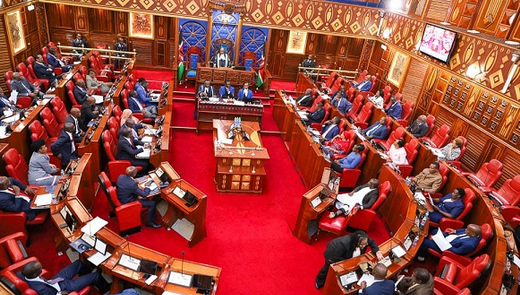
Senate Session
All eyes were on the Senate this week as Isiolo Governor Abdi Guyo appeared before lawmakers for trial after his impeachment by the Isiolo County Assembly.
Guyo narrowly escaped impeachment after the Senate ruled that the process leading to his ouster was marred by procedural irregularities and possible document forgery.
At the heart of the controversy were impeachment sittings alleged to have occurred on June 18 and June 26, which, according to the Senate, either did not happen or were unlawfully convened.
The collapse of the impeachment motion was less about the substance of the accusations—abuse of office, gross misconduct, and inflated staffing—and more about the integrity of the process itself.
The Senate was particularly disturbed by forged Hansard records and the absence of certification, calling into question the credibility of the County Assembly’s evidence.
Additionally, the Senate respected an active High Court order that declared the process null and void, effectively rendering any further discussion moot.
A decisive 31 senators sided with Guyo’s defense, halting the proceedings and exposing deep procedural lapses within the Isiolo County Assembly.
Even as the Senate settled legal fireworks, the National Assembly turned to future-facing legislation.
The Second Reading of the Virtual Asset Service Providers Bill (Bill No. 15 of 2025) marked a strategic step in Kenya’s ambition to lead in Africa’s digital finance space.
Spearheaded by Molo MP Kuria Kimani, the Bill proposes a comprehensive regulatory framework for the burgeoning virtual asset sector.
With over six million users and an annual trading volume of US$2 billion, Kenya is now third in Africa in blockchain-based transactions.
"We have potential in this space to generate at least US$1 billion in terms of foreign direct investment," Kimani asserted.
The Bill reflects a growing recognition of crypto-assets not as speculative fringe activity but as a legitimate economic driver requiring oversight.
If passed, the legislation could position Kenya as a digital finance hub—yet it must balance innovation with safeguards against money laundering, fraud, and market volatility.
In another layer of legislative activity, President William Ruto returned two key Bills—the National Land Commission (Amendment) Bill, 2023, and the Cancer Prevention and Control (Amendment) (No. 2) Bill, 2022—to Parliament under Article 115 of the Constitution, signaling active use of his veto power.
The National Land Commission Bill seeks to streamline land administration—an area historically fraught with political landmines.
The President’s reservations are believed to focus on ambiguities that may impede efficient land governance.
More significantly, the Cancer Prevention Bill, passed over a year ago, seeks to enhance Kenya’s response to the rising cancer burden.
Ruto’s reservations reportedly address technical and policy aspects intended to strengthen its practical implementation.
Speaker Moses Wetang’ula directed that both matters be reviewed by the relevant committees, putting the onus on Parliament amend the Bills in line with the President’s views.











